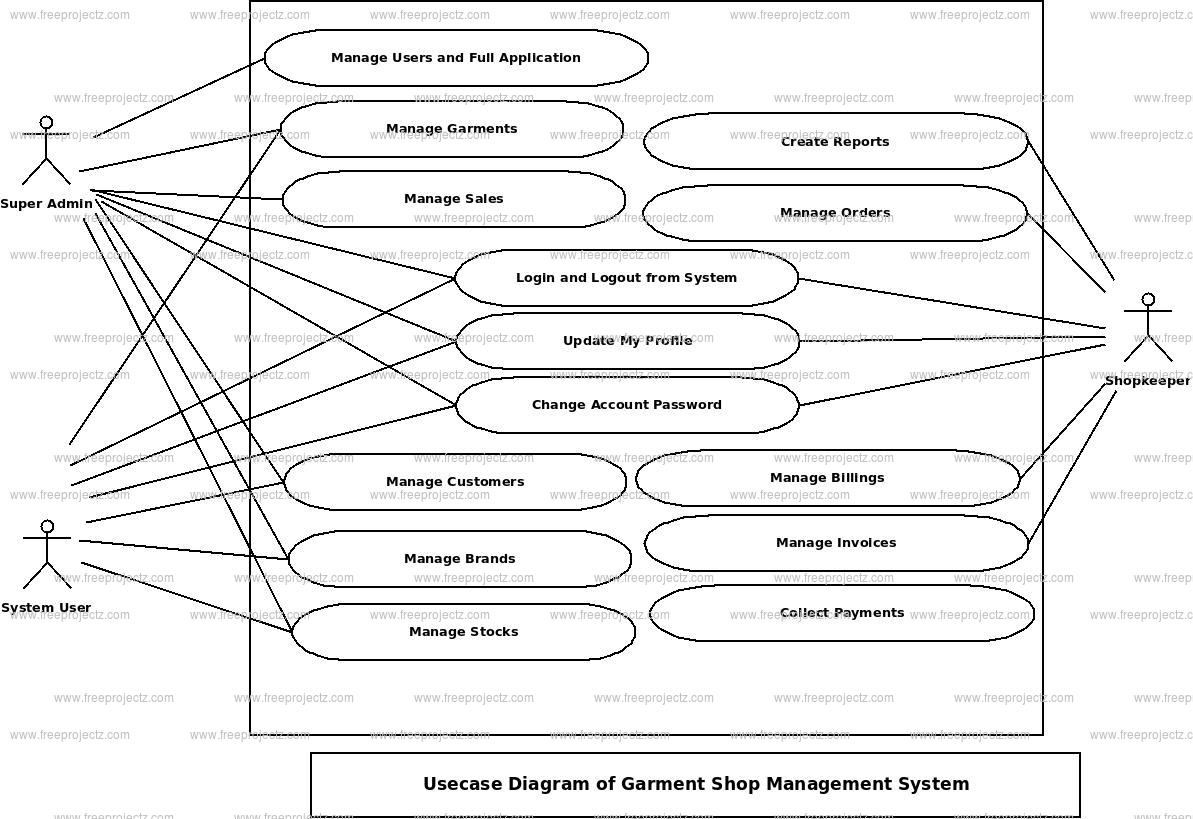- Posted By: freeproject
- Comments: 0
- Posted By: freeproject
- Comments: 0
Garment Inventory System Activity Diagram
This is the Activity UML diagram of Garment Inventory System which shows the flows between the activity of Stocks, Customers, Inventory, Garments, Brands. The main activity involved in this UML Activity Diagram of Garment Inventory System are as follows:
- Stocks Activity
- Customers Activity
- Inventory Activity
- Garments Activity
- Brands Activity
Features of the Activity UML diagram of Garment Inventory System
- Admin User can search Stocks, view description of a selected Stocks, add Stocks, update Stocks and delete Stocks.
- Its shows the activity flow of editing, adding and updating of Customers
- User will be able to search and generate report of Inventory, Garments, Brands
- All objects such as ( Stocks, Customers, Brands) are interlinked
- Its shows the full description and flow of Stocks, Garments, Brands, Inventory, Customers

Login Activity Diagram of Garment Inventory System:
This is the Login Activity Diagram of Garment Inventory System, which shows the flows of Login Activity, where admin will be able to login using their username and password. After login user can manage all the operations on Inventory, Stocks, Customers, Brands, Garments. All the pages such as Customers, Brands, Garments are secure and user can access these page after login. The diagram below helps demonstrate how the login page works in a Garment Inventory System. The various objects in the Brands, Inventory, Stocks, Customers, and Garments page—interact over the course of the Activity, and user will not be able to access this page without verifying their identity.
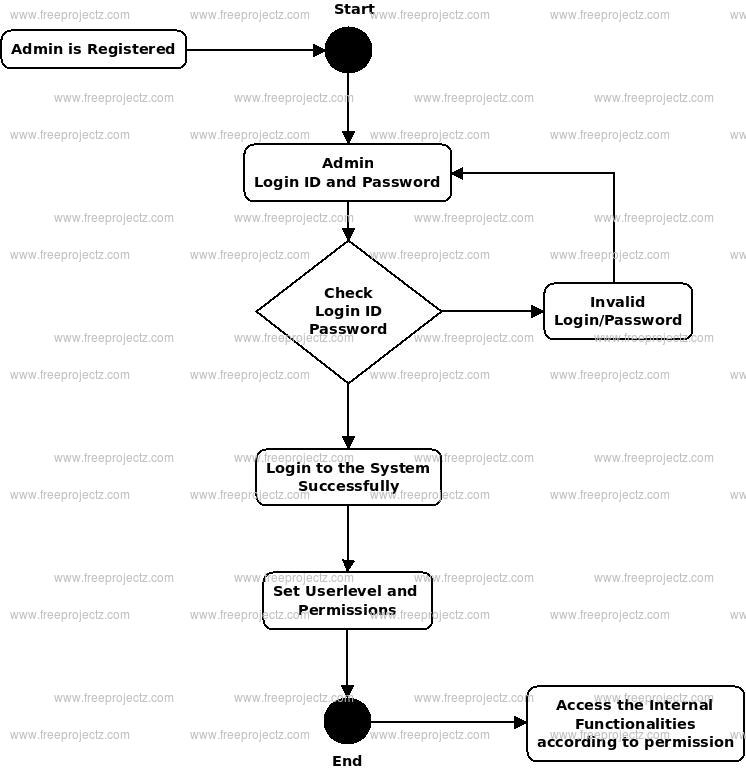
- Posted By: freeproject
- Comments: 0
Garment Inventory System Class Diagram
Garment Inventory System Class Diagram describes the structure of a Garment Inventory System classes, their attributes, operations (or methods), and the relationships among objects. The main classes of the Garment Inventory System are Brands, Inventory, Stocks, Garments, Sales, Customers.
Classes of Garment Inventory System Class Diagram:
- Brands Class : Manage all the operations of Brands
- Inventory Class : Manage all the operations of Inventory
- Stocks Class : Manage all the operations of Stocks
- Garments Class : Manage all the operations of Garments
- Sales Class : Manage all the operations of Sales
- Customers Class : Manage all the operations of Customers
Classes and their attributes of Garment Inventory System Class Diagram:
- Brands Attributes : brand_id, brand_name, brand_company, brand_type, brand_description
- Inventory Attributes : inventory_id, inventory_items, inventory_number, inventory_type, inventory_description
- Stocks Attributes : stock_id, stock_items, stock_number, stock_type, stock_description
- Garments Attributes : garment_id, garment_brand_id, garment_name, garment_quality, garment_type, garment_description
- Sales Attributes : sales_id, sales_customer_id, sales_amount, sales_type, sales_description
- Customers Attributes : customer_id, customer_name, customer_mobile, customer_email, customer_username, customer_password, customer_address
Classes and their methods of Garment Inventory System Class Diagram:
- Brands Methods : addBrands(), editBrands(), deleteBrands(), updateBrands(), saveBrands(), searchBrands()
- Inventory Methods : addInventory(), editInventory(), deleteInventory(), updateInventory(), saveInventory(), searchInventory()
- Stocks Methods : addStocks(), editStocks(), deleteStocks(), updateStocks(), saveStocks(), searchStocks()
- Garments Methods : addGarments(), editGarments(), deleteGarments(), updateGarments(), saveGarments(), searchGarments()
- Sales Methods : addSales(), editSales(), deleteSales(), updateSales(), saveSales(), searchSales()
- Customers Methods : addCustomers(), editCustomers(), deleteCustomers(), updateCustomers(), saveCustomers(), searchCustomers()
Class Diagram of Garment Inventory System :
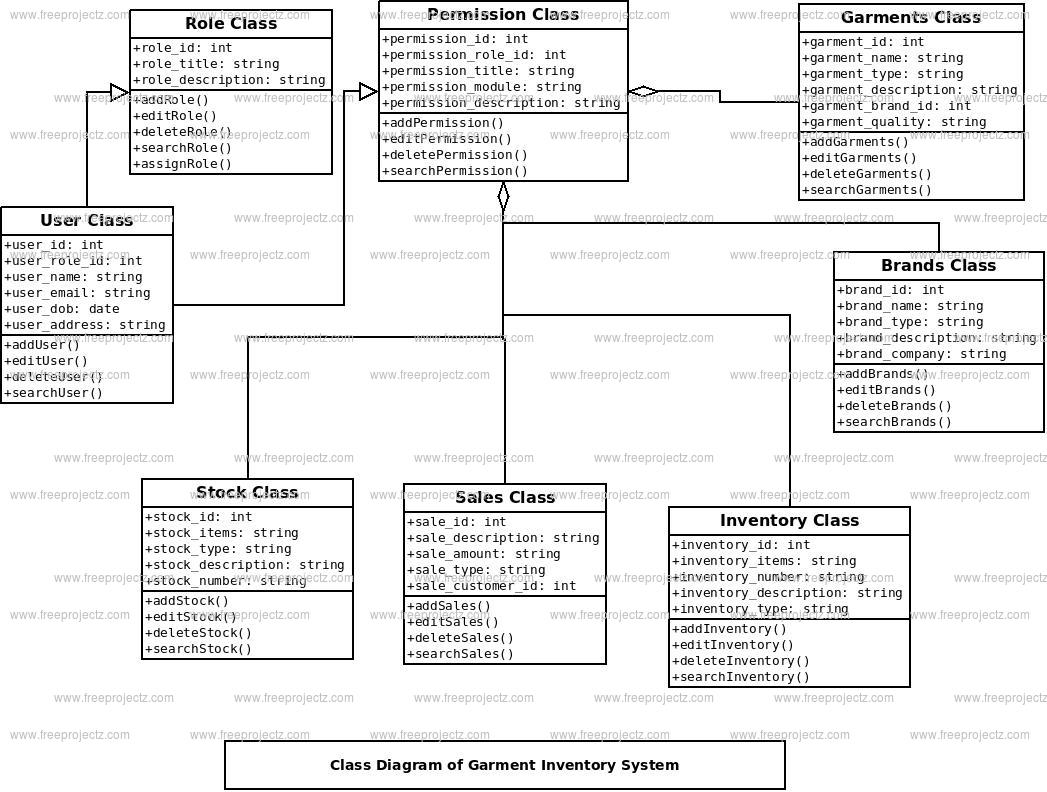
- Posted By: freeproject
- Comments: 0
Garment Inventory System Component Diagram
This is a Component diagram of Garment Inventory System which shows components, provided and required interfaces, ports, and relationships between the Garments, Customers, Stocks, Brands and Sales. This type of diagrams is used in Component-Based Development (CBD) to describe systems with Service-Oriented Architecture (SOA). Garment Inventory System UML component diagram, describes the organization and wiring of the physical components in a system.
Components of UML Component Diagram of Garment Inventory System:
- Garments Component
- Customers Component
- Stocks Component
- Brands Component
- Sales Component
Featues of Garment Inventory System Component Diagram:
- You can show the models the components of Garment Inventory System.
- Model the database schema of Garment Inventory System
- Model the executables of an application of Garment Inventory System
- Model the system's source code of Garment Inventory System

- Posted By: freeproject
- Comments: 0
Garment Inventory System ER Diagram
This ER (Entity Relationship) Diagram represents the model of Garment Inventory System Entity. The entity-relationship diagram of Garment Inventory System shows all the visual instrument of database tables and the relations between Inventory, Garments, Brands, Customers etc. It used structure data and to define the relationships between structured data groups of Garment Inventory System functionalities. The main entities of the Garment Inventory System are Brands, Inventory, Stocks, Garments, Sales and Customers.
Garment Inventory System entities and their attributes :
- Brands Entity : Attributes of Brands are brand_id, brand_name, brand_company, brand_type, brand_description
- Inventory Entity : Attributes of Inventory are inventory_id, inventory_items, inventory_number, inventory_type, inventory_description
- Stocks Entity : Attributes of Stocks are stock_id, stock_items, stock_number, stock_type, stock_description
- Garments Entity : Attributes of Garments are garment_id, garment_brand_id, garment_name, garment_quality, garment_type, garment_description
- Sales Entity : Attributes of Sales are sales_id, sales_customer_id, sales_amount, sales_type, sales_description
- Customers Entity : Attributes of Customers are customer_id, customer_name, customer_mobile, customer_email, customer_username, customer_password, customer_address
Description of Garment Inventory System Database :
- The details of Brands is store into the Brands tables respective with all tables
- Each entity (Customers, Stocks, Sales, Inventory, Brands) contains primary key and unique keys.
- The entity Stocks, Sales has binded with Brands, Inventory entities with foreign key
- There is one-to-one and one-to-many relationships available between Sales, Garments, Customers, Brands
- All the entities Brands, Sales, Stocks, Customers are normalized and reduce duplicacy of records
- We have implemented indexing on each tables of Garment Inventory System tables for fast query execution.
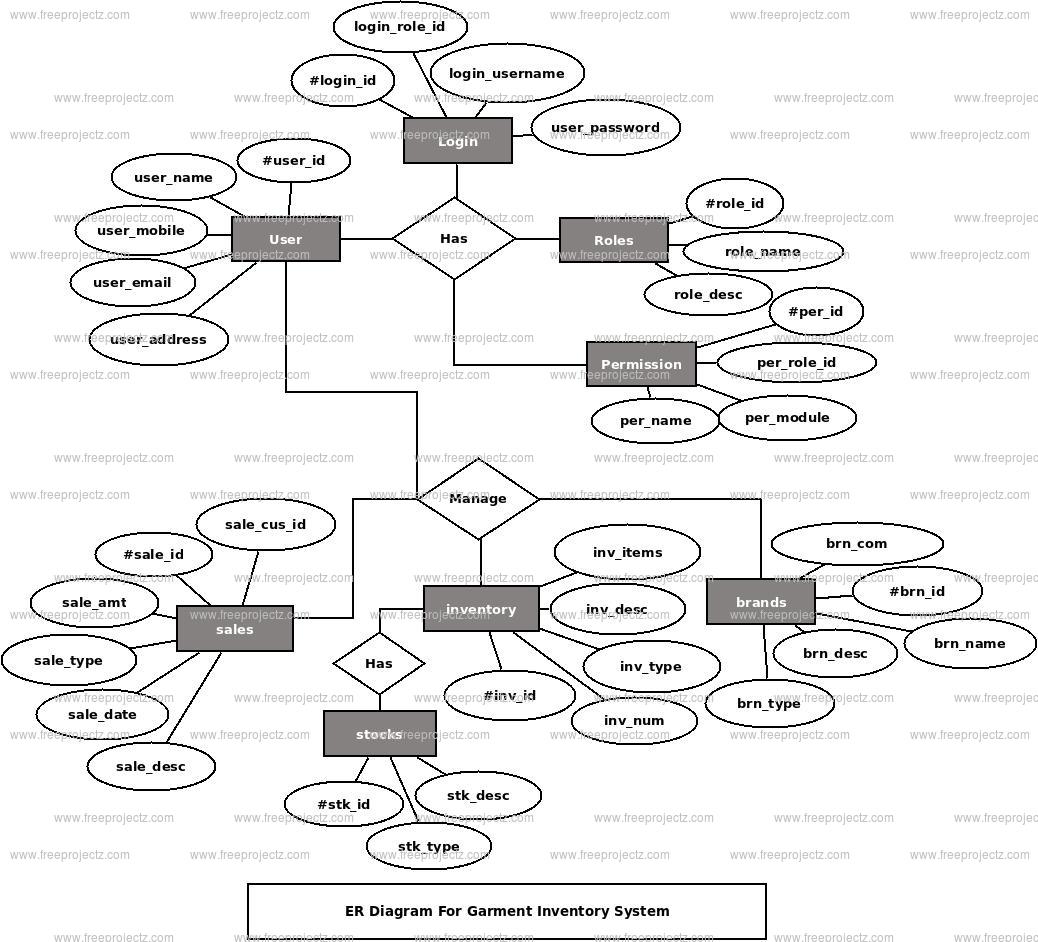
- Posted By: freeproject
- Comments: 0
Garment Inventory System Sequence Diagram
This is the UML sequence diagram of Garment Inventory System which shows the interaction between the objects of Inventory, Brands, Customers, Sales, Garments. The instance of class objects involved in this UML Sequence Diagram of Garment Inventory System are as follows:
- Inventory Object
- Brands Object
- Customers Object
- Sales Object
- Garments Object
Login Sequence Diagram of Garment Inventory System:
This is the Login Sequence Diagram of Garment Inventory System, where admin will be able to login in their account using their credentials. After login user can manage all the operations on Customers, Inventory, Brands, Garments, Sales. All the pages such as Brands, Garments, Sales are secure and user can access these page after login. The diagram below helps demonstrate how the login page works in a Garment Inventory System. The various objects in the Garments, Customers, Inventory, Brands, and Sales page—interact over the course of the sequence, and user will not be able to access this page without verifying their identity.
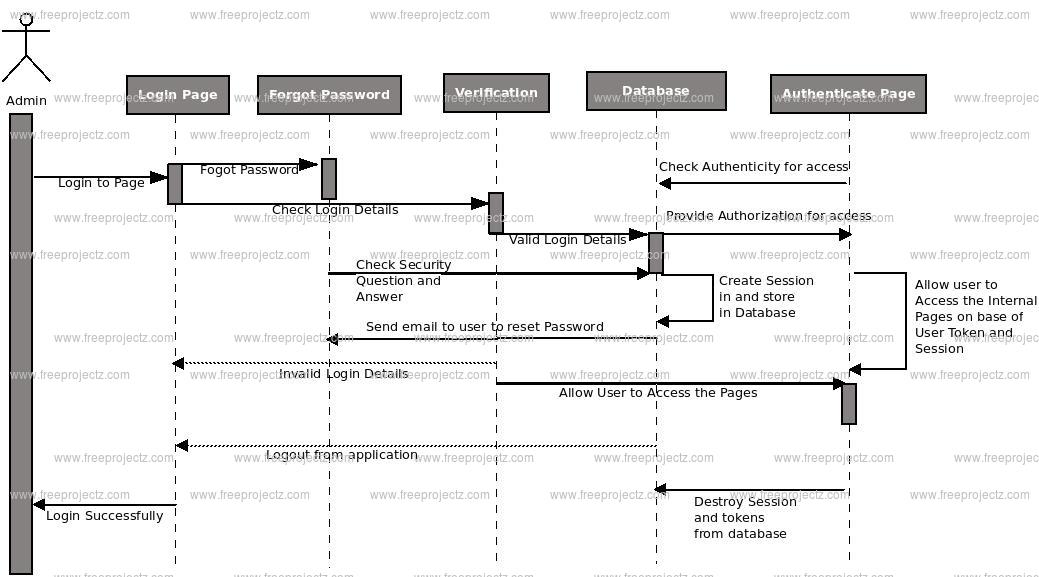
This is the UML sequence diagram of Garment Inventory System which shows the interaction between the objects of Inventory, Brands, Customers, Sales, Garments. The instance of class objects involved in this UML Sequence Diagram of Garment Inventory System are as follows:
- Inventory Object
- Brands Object
- Customers Object
- Sales Object
- Garments Object
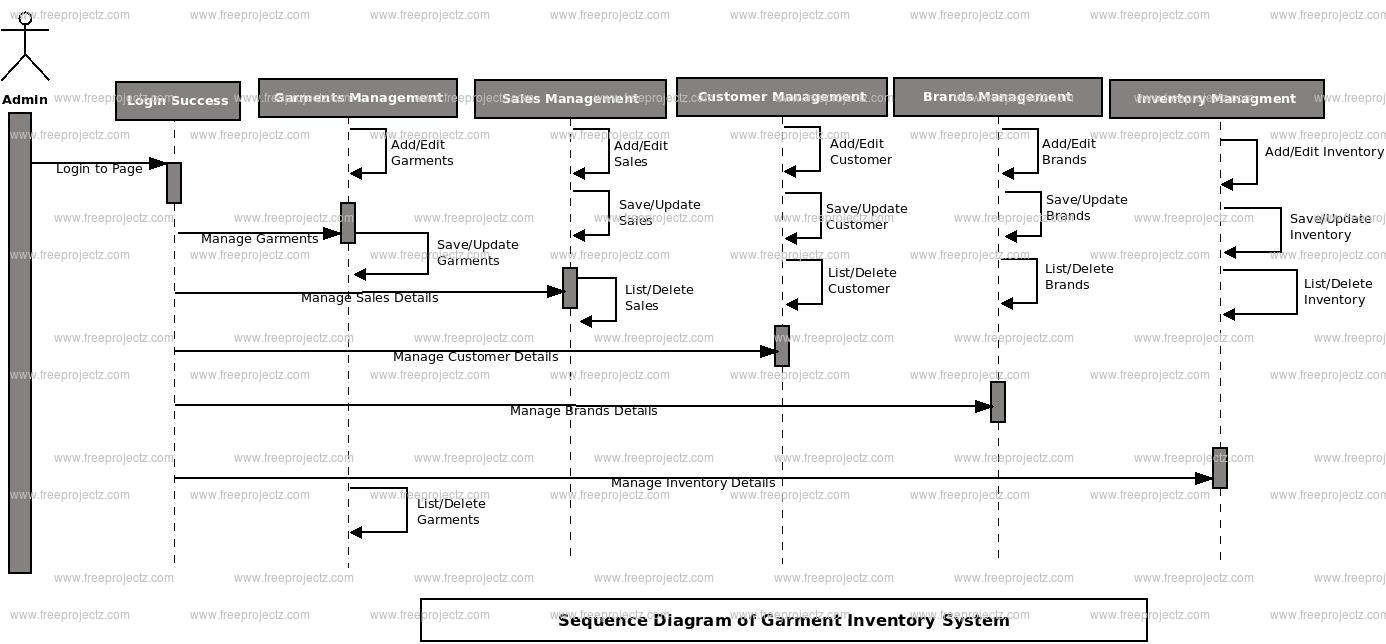
- Posted By: freeproject
- Comments: 0
Garment Shop Management System Use Case Diagram
This Use Case Diagram is a graphic depiction of the interactions among the elements of Garment Shop Management System. It represents the methodology used in system analysis to identify, clarify, and organize system requirements of Garment Shop Management System. The main actors of Garment Shop Management System in this Use Case Diagram are: Super Admin, System User, Shopkeeper, Anonymous Users, who perform the different type of use cases such as Manage Garments, Manage Sales, Manage Customers, Manage Brands, Manage Inventory, Manage Stocks, Manage Users and Full Garment Shop Management System Operations. Major elements of the UML use case diagram of Garment Shop Management System are shown on the picture below.
The relationships between and among the actors and the use cases of Garment Shop Management System:
- Super Admin Entity : Use cases of Super Admin are Manage Garments, Manage Sales, Manage Customers, Manage Brands, Manage Inventory, Manage Stocks, Manage Users and Full Garment Shop Management System Operations
- System User Entity : Use cases of System User are Manage Garments, Manage Sales, Manage Customers, Manage Brands, Manage Inventory, Manage Stocks
- Shopkeeper Entity : Use cases of Shopkeeper are Manage Orders, Manage Billings, Manage Invoices, Create Bills, Collect Payments, Create Reports
- Anonymous Users Entity : Use cases of Anonymous Users are View Information, Fill Contact Us, Search Content
Use Case Diagram of Garment Shop Management System :
